Ferenc Farkas: Orchestral Music, Volume Three — Music for Oboe and Strings
This third release in a series of recordings of orchestral music by the Hungarian composer Ferenc Farkas (1905-2000) — this time featuring works for oboe and strings — highlights the characteristics that make his music so appealing: catchy tunes, transparent scoring, buoyant rhythms and a fondness for Baroque forms and folk-dances. Two chamber pieces featuring the oboe and cor anglais offer textural contrast.
Lajos Lenscés, oboe
János Rolla, violin
Franz Liszt Chamber Orchestra
Listen To This Recording:
- Old Hungarian Dances: I Intrada
- Old Hungarian Dances: II Slow dance
- Old Hungarian Dances: III Shoulder-blade dance
- Old Hungarian Dances: IV Dance of the Prince of Transylvania
- Old Hungarian Dances: V Dance of Lazar Apor
- Old Hungarian Dances: VI Chorea
- Old Hungarian Dances: VII Leaping Dance
- Musica serena: I Allegro
- Musica serena: II Andante moderato
- Musica serena: III Allegro vivace
- Maschere: I Il capitano
- Maschere: II Pantalone
- Maschere: III Colombina
- Maschere: IV Povero Pulcinella
- Maschere: V Arlecchino
- Piccola Musica di Concerto: I Allegro
- Piccola Musica di Concerto: II Andante
- Piccola Musica di Concerto: III Scherzo
- Piccola Musica di Concerto: IV Allegro
- Concertino IV: I Allegro
- Concertino IV: II Andante (Choral varie)
- Concertino IV: III Allegro
- Music for Zanka: I Sonatina
- Music for Zanka: II Arietta
- Music for Zanka: III Rondo
- Ricordanze
- Aria e rondo all’ungherese: Aria
- Aria e rondo all’ungherese: Rondo all’ungherese
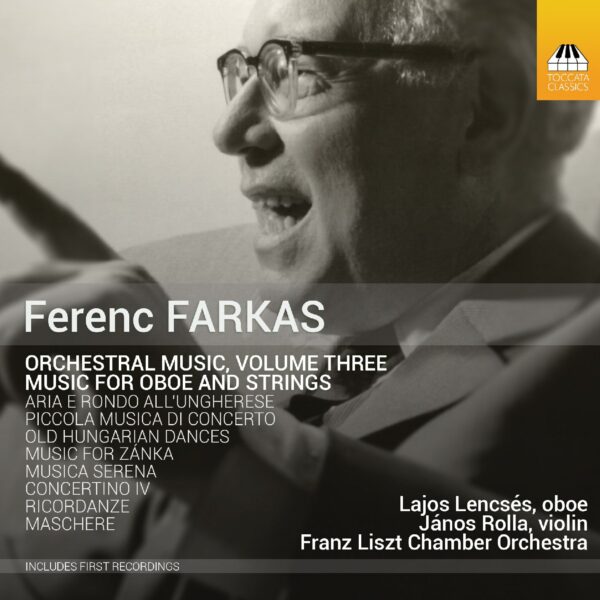
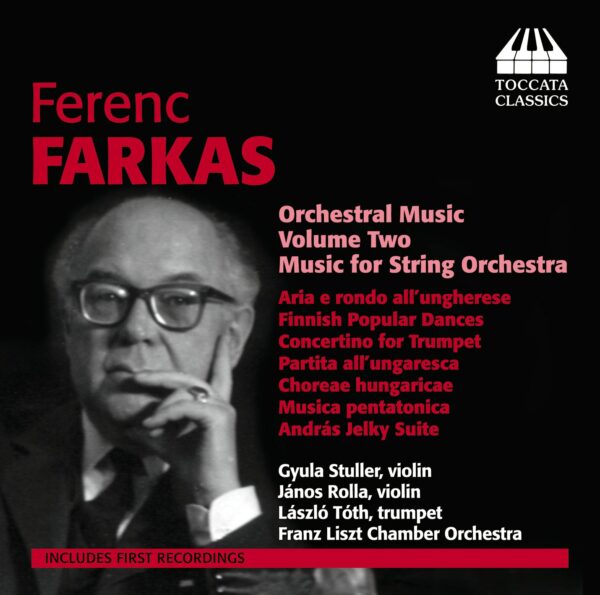
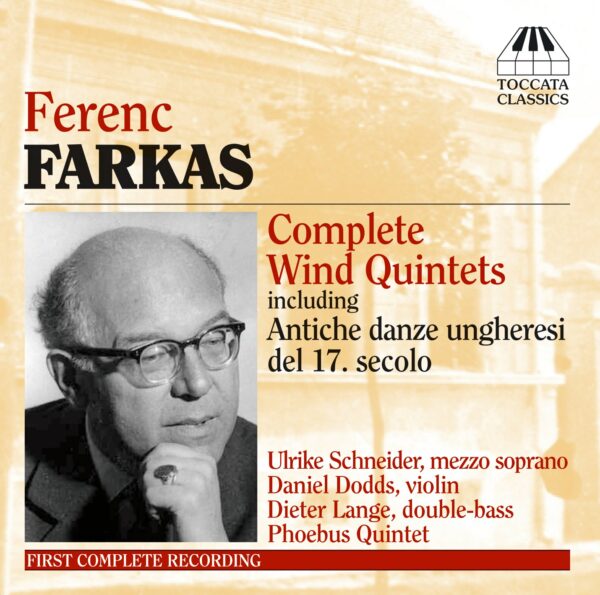
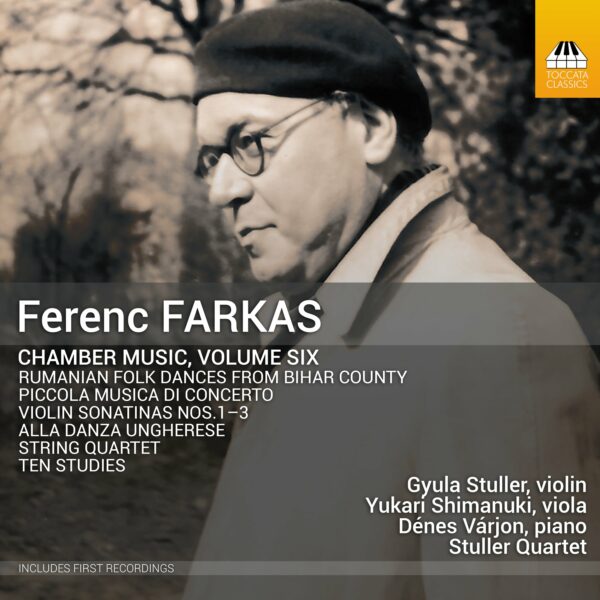
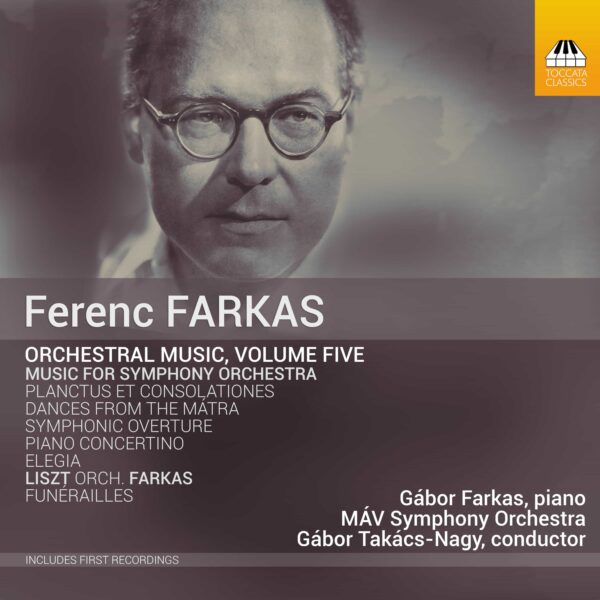
Fanfare Magazine :
‘One important point to note is that Farkas studied in Italy for a time under Respighi, and the influence is very clear in his Old Hungarian Dances, which sound like a fourth set of Respighi’s Ancient Airs and Dances––especially in this arrangement for oboe and string orchestra. This popular work exists in several different instrumentations; I see that a version for wind quintet has been recorded. … Farkas was something of a polystylist, but generally speaking his harmonic acerbity and formal succinctness suggest the Neoclassical Stravinsky of the Concerto for String Orchestra. Bartók is an inevitable influence too. Vigorous is again the word to describe this music and the performances. … For all its Neoclassical element, Farkas’s work never gives a feeling of detachment: It contains both heart and wit, and these musicians fully exploit those characteristics.
The esteemed Hungarian oboist Lajos Lencsés is the central soloist. Though he was in his 70th year when this program was recorded (in 2014), his poise, liquid tone, and technique remain as assured as ever. Lencsés knew Farkas well and, while not all these works were written for him, he requested arrangements from the composer, and convinced Farkas to let him arrange the Old Hungarian Dances with oboe instead of flute. Overall, this is enjoyable music by a true craftsman, played immaculately by Lencsés and with an appropriately gutsy attack from the string orchestra. The other soloists, who have much less to do, also make a fine contribution.’
—Phillip Scott, Fanfare Magazine, September 2015
Daily Classical Music :
‘… Farkas solved the problem of finding his own voice as a Hungarian composer living in the shadow of Bartók and Kodály by largely turning to neo-classicism — from his studies with Respighi he learned refinement and craft, which he allied to a concern for the patchy development of Hungarian music in the seventeenth and eighteenth centuries and looked backward in order to go forward.
Both influences are evident in the opening suite of Old Hungarian Dances for oboe and strings, where Respighi’s Ancient Airs and Dances invite an immediate comparison. The pupil is well up to the master, where Farkas’ sympathetic and inventive treatments make a delightful suite, with Lajos Lencsés appearing as both soloist and arranger of the oboe and strings version. … Farkas has the true craftsman’s ability to not ‘write down’, but produce playable music which nevertheless does not stint on inventiveness or interest. … The Franz Liszt Chamber Orchestra performs with obvious care and commitment, and Toccata’s recording is clean and clear. Most of this music is not about grand statements of life and death, but the quality of the writing, both in technical terms and those of invention, make it a very rewarding listen.’
—Paul Sarcich, Daily Classical Music, September 2015
Das Orchester :
‘These twenty works from the years 1930 to 1994 are combined on three CDs to an impressive portrait that is realized sonically perfect. For all artists – Vol. 1:.. Miklós Perényi (cello), Vol 2: Gyula Stuller / János Rolla (violin), László Tóth (trumpet) and Vol 3: Lajos Lencsés (oboe, English horn), Lajos Rozman (clarinet) Andrea Horváth (bassoon), Emily grains / János Rolla (violin), Andra Darzin (Viola), Zoltán Paulich (cello) – are familiar for decades with Ferenc Farkas and enjoy at home and in the world a high reputation.’
—Eberhard Kneipel, Das Orchester, October 2015
American Record Guide :
‘Farkas was known for his “old wine in new bottles” methods—both in using material from previous eras (as in the Old Hungarian Dances and Ricordanze) and for arranging his own music for different ensembles (Maschere, Music for Zanka, Aria and Rondo). … Lecses and the Franz Liszt Chamber Orchestra play the Oboe Concertino beautifully, with excellent sensitivity, balance, and interplay. The choral-like II is especially satisfying. Hungarian oboist Lajos Lencses blends virtuosity, sensitivity, and humor, bringing extra flavor to music that otherwise could sound simply ordinary. This disc is enjoyable on its own, but is particularly recommended for people eager to collect Farkas’s orchestral music.’
—Luke Pfeil, American Record Guide, March 2016
MusicWeb International :
‘As usual the disc is well annotated, performances are adept and full of apt feeling and the sound is bound to please.’
—Rob Barnett, MusicWeb International